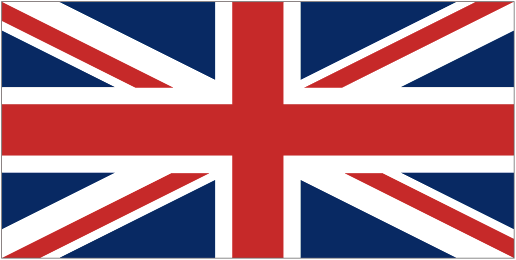 |
England
(Great Britian) |
 |
England
(Great Britian) |
English Ancestors of the Wimberly Family in America |
| There
were two branches of the Wimberley family in England that could have been
responsible for the establishment of the Wimberly surname in the Virginia
colonies. These were the Thomas Wimberley and the Christopher
Wimberley branches. The Thomas Wimberley branch was located in Pinchbeck
& South Witham, Lincolnshire Co, England and the Christopher
Wimberley branch came from Bitchfield, Lincolnshire Co, England.
Let's first examine, however, the spelling of the Wimberly name and the
origin of the Wimberly surname.
Early spellings of the Wimberly name varied. Some examples are: Wimbaldesley, Wymbaldesley, Wimbaldsley, Wimbaldeslegh, Wimberley, Wimbersley, Wimberleigh, Wymbersley, Wemberesley, Whimberley, Winmarleigh, Wimbley, Wembly, Winberry, and finally, Wimberly. The evolution of the Wimberly name might be as follows: |
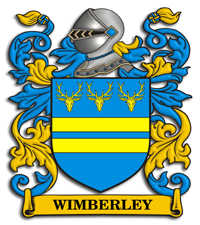 |
|
|
|
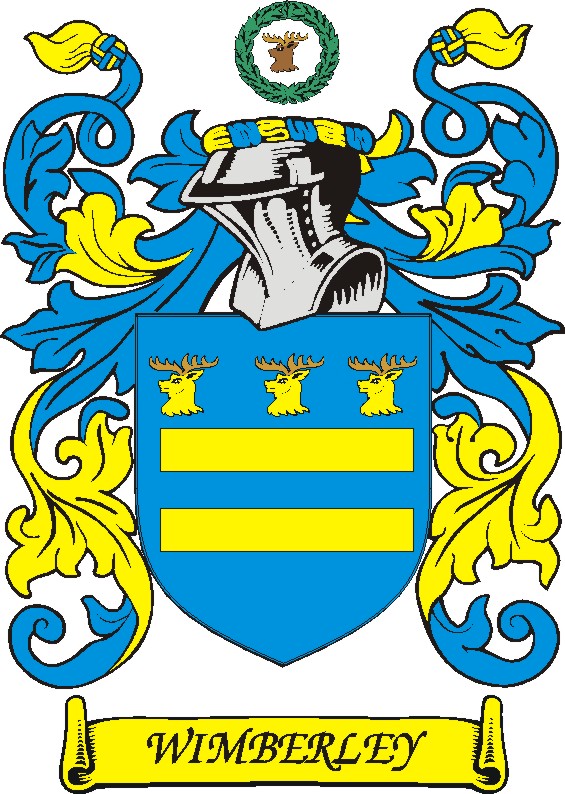 |
The Wimberly surname
can be traced back to the Domesday Book which was ordered by William of
Normandy in the year 1085 A.D. of all property owners in England. William
ordered the territory he controlled to be taken from the nobility and large
landowners and divided among his followers. William wanted to know how
much land he owned, how the rest was divided, and how the land was peopled.
Later, the Domesday Book was used by tax collectors to raise money from
William's subjects. William of Normandy started the first census/tax rolls
in the world.
The Domesday Book covered all the territory William controlled except for the City of London. The King's authority did not include Northumberland, Cumberland, Durham or Westmorland counties. |
| According to Captain Douglas Wimberley,
formerly of the 79th or Cameron Highlanders, the family name of Wimberley
had its beginnings in the Lancashire village of Winmarleigh, located near
Garstang, 30 miles north of Liverpool, England. There are several references
to people living there in old documents discovered by William Clarke Wimberley
in his genealogical research he did on the Wimberley family name in the
1750's.
The family of Wimberley or Wimbaldesley owned manors in the counties of Cheshire and Lancaster. The name of four sons of Wimbald are registered in the Domesday Book, as "Wimbald, Leofwin, Albert, and Levenot." Many manors were registered in the same book under the name of Wimbaldlai, indicating a Saxon origin |
| In the reign of Henry III (1216 A.D.- 1272 A.D.), Gregory de Wimberley held lands in Lancashire under military service, called Winmarleigh; his name occurs in several old deeds. In the 23rd year (1239 A.D.) of Henry III, he quit claimed the land to Geoffrey Prior of Lancaster 100 acres of land in Hull. In the 17th year (1344 A.D.) of Edward III reign, Thomas de Wimbersley, styled "le Gentil", Katharine his wife, and Ranulf, their son, passed a fine (conveyed) to Robert de Plessington for one-half of the manor of Wimbersley, then called Winmarleigh. | 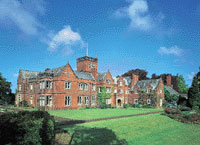 |
| This Winmarleigh is two miles from Garstand, and afterwards became the property of the Ratcliffe family, by the marriage of Richard Dominus de Ratcliffe to Isabel, daughter and co-heiress of Plessington de Wimbersley, in 1347 A.D. In recent times, it gave the title of Baron to Colonel Wilson-Patten, who was a member of parliament. It was sold in 1948 to the County Council of Lancashire and is now an institute of agriculture. It also has a school for IT training and is used as a convention center. |
|
|
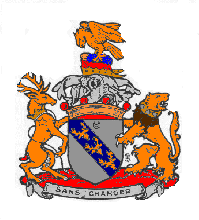 |
William Clarke Wimberley traced the Wimberley
family name back to 1485 when William Wymberley (1455-1525) moved
from Winmarleigh, Lancashire to South Witham in Lincolnshire County, England
when he was about 30 years old. William served as a retainer (paid soldier)
under Lord Stanley's Coat-of-Arms in the Battle of Bosworth Field
in 1485. King Richard III was killed in this battle by men loyal to
Henry Tudor who later became King Henry VII. For
an interesting description of the Battle of Bosworth Field,
click
here.
|
| William Wimberley married Ann Hawarden, sister and heiress of Robert Hawarden of Ruthlandshire in about 1500. They had three sons, Thomas, Christopher, Lawrence, and a daughter whose name is unknown. Thus, started the name of Wimberley as an old and respected family in Lincolnshire, England, and eventually, the colony of Virginia in America. |
|
|
| The Wimberly family
started in America in about 1672-1673 when either William or John Wimberly
left England and immigrated to to the Colony of Virginia. We are not sure
which William or John from the two branches of the Wimberley family was
the immigrant.
However, on March 25, 1672 a John Wimberly received a patent on 300 acres of land in Nansemond County, Virginia formerly granted to Israel Johnson, who did not seat it. John also received a 400 acre land grant in 1673 for paying the transportation of eight persons to the Virginia Colony. These persons were: Richard Arms; Hester Jones; William Elsey; John Wimberly (1634-1704) and his son John Wimberly (1655-1725); and Peter Field, his wife and son. Some researchers claim John Wimberly did not receive a separate 400 acre patent for his transportation of eight persons, but 400 acres total, including the 300 acres formerly granted to Israel Johnson. We also know a John Wimberley signed the Pinchbeck Church; Pinchbeck, Lincolnshire, England, records in 1683 as Warden of the Church. If this is the same John Wimberly that immigrated, why did he return to England from America? John, of Pinchbeck and South Witham, was the commissioner of Supply (appointed by King Charles II) in his native Lincolnshire in 1660 and 1666. We do know the people of Virginia were very loyal to the Stuarts. When the quarrel between the King and Parliament in England reached the stage of civil war (1642), and Charles I was driven from his throne and beheaded (1649), many of his supporters in England, who were called Cavaliers, emigrated to Virginia, giving the colony a decidedly aristocratic character. And when Charles II was restored to his father's throne in 1660, the Virginian burgesses recognized his authority so promptly and enthusiastically that he called them "the best of his distant children." Two other Wimberly's came to America at about the same time as John Wimberly. They were indentured servants of Thomas Milner who received his land grant on Dumplin Island, Nansemond County, Virginia on October 9, 1672 for transporting three persons: William Wimberly; Peter Wimberly; and Catherine Barstable, who was probably the future Mrs. Peter Wimberly. Peter could have been the son of William Wimberly. This Wimberly could have been the William who was from London, England. (questions, questions, questions, and very few answers!) The British burned the Nansemond County Court house during the War of 1812 and destroyed all of the early Virginia emigration records. Some of these records were replaced by the British after the war from records kept in England, but many were lost. We can find no record of John Wimberly owning any land in Nansemond County after 1700. We might never find a solid connection between the John Wimberly who left a will in Bertie County, NC in 1742 and was born about 1674 and the John or William Wimberly who immigrated to America. But we do know about the Wimberly family from this John Wimberly forward. |
|
|
| The Wimberley family migrated from Virginia to North Carolina, (even this is disputed by some genealogists who believe the Virginia Colony extended southward into portions of what is now North Carolina and the land John Wimberley acquired by land grant was in what is now North Carolina, not Virginia) then to South Carolina, and there the family split. Some migrated to Georgia and Florida, others migrated to Tennessee, Later, the Wimberlys moved to Mississippi, Louisiana, Alabama, Kentucky and, in the case of my family, Jefferson County, Illinois. Later, they spread out to Arkansas, Missouri, Texas, California, Nevada and Oregon. |
|
|
| The 1990 US census (251,610,040)
counts about
754,830 people with the surname Wimberly living
in the United States. The Wimberly surname ranks 3,843 out ofa total
of 88,799
surnames in the United States.
There are about 25,161 people in the United States with the surname spelled Wimberley. |
|
This page was last updated on: August 15, 2008 Copyrighted 1999, 2000, 2001,2002, 2008 Thomas L. Wimberly |